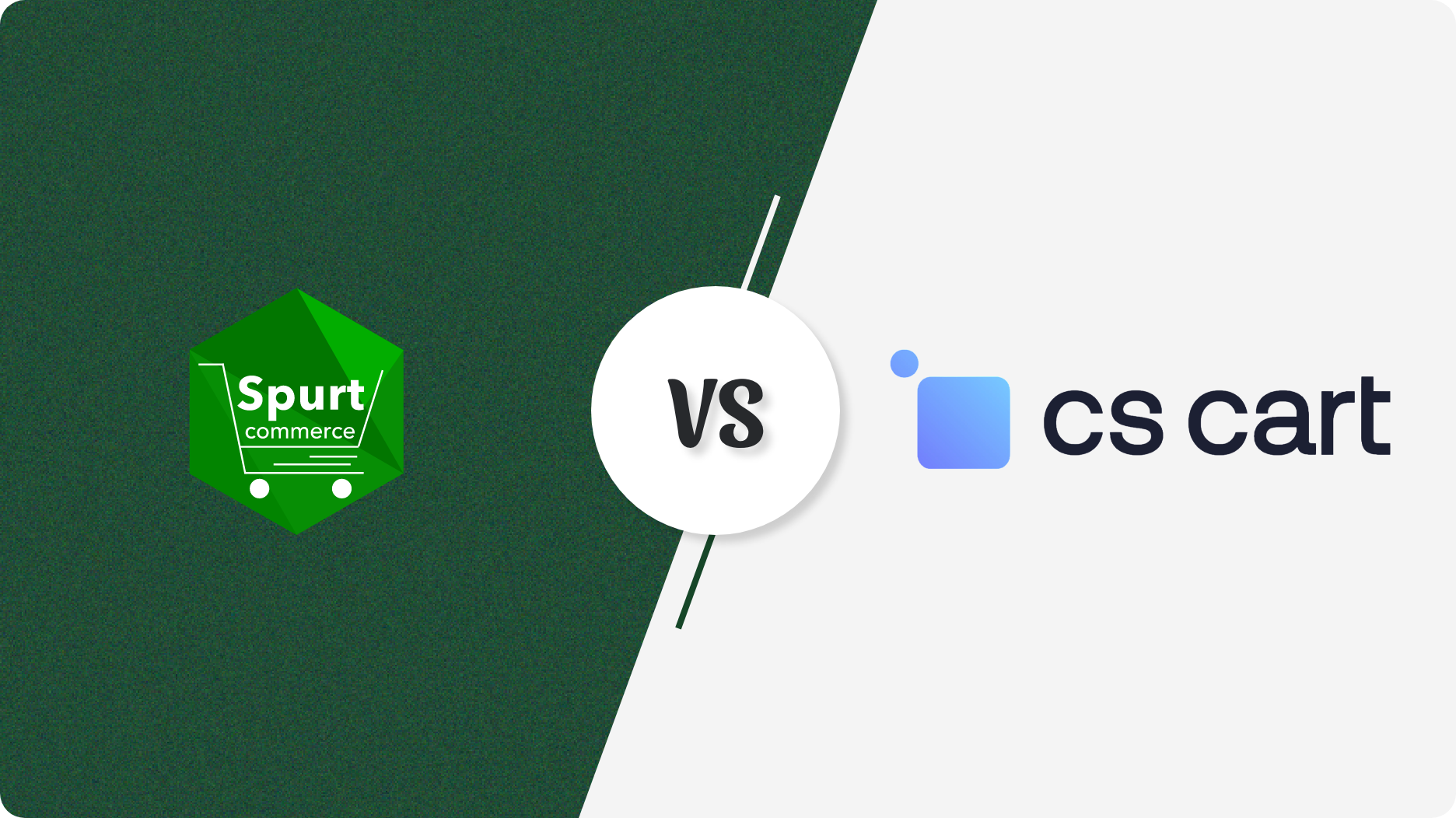COMPARISON
Spurtcommerce vs CS-Cart Multi-Vendory

A Practical Comparison for Modern E-commerce Development
Overview
This comparison examines Spurtcommerce, a JavaScript, headless platform, against CS-Cart Multi-Vendor, a PHP-based marketplace solution. Both support B2C marketplaces with full source code access, but Spurtcommerce excels with API-first design, modern technologies,and integrated mobile apps.
About Spurtcommerce
Spurtcommerce is built on Node.js/Express.js, with flexible deployment and headlesssupport. It delivers Angular and React/Next.js storefronts and a Flutter mobile app.Marketplace features—such as seller onboarding, commission rules, and dashboards—are ready to go. Full enterprise code access includes microservices, allowing deep customization. AddOns handle SEO, chat, etc., without needing to touch the core.
About CS-Cart Multi-Vendor
CS-Cart Multi-Vendor is a mature PHP-based platform that provides marketplace essentials: vendor onboarding, commission handling, shipping integration, warehouse management, and multi-language support. A mobile app source is also available. While it offers many built-in tools, it’s built on monolithic PHP and uses Smarty templates for themes.Customization is limited to PHP and template overrides.
Key Differences – Spurtcommerce vs Shopify
| FEATURE | SPURTCOMMERCE | CS-Cart Multi-Vendor |
|---|---|---|
| Tech Stack | Node.js + Express.js, Angular/React storefronts, Flutter app | PHP backend, Smarty template engine |
| Architecture | API-first, headless,monolithic/microservices | Monolithic MVC |
| Frontend Options | Angular/React storefronts | Smarty-based storefronts |
| Mobile App | Built-in Flutter app | Mobile source available |
| Marketplace Support | Native multi-vendor, seller panels,commission rules | Fully-featured marketplace platform |
| Dashboards | Separate admin and seller dashboards | Unified admin & vendor panels |
| Functional Features | SEO, Support Ticket, multilingual AddOns | Warehouse support, shipping carriers, multilingual |
| Source Code | Full access in paid editions | Full access, including microservices in enterprise edition |
| Performance | Lightweight and scalable | Monolithic PHP requiring robust server setups |
| Customization | JS AddOns and headless architecture | PHP template and add-on based customization |
| Time to Market | Quick launch for mobile, storefront, and marketplace | Fast marketplace, but frontend tech is legacy |
Spurtcommerce is ideal for:
- JavaScript-oriented development teams seeking headless architecture
- Businesses launching B2C marketplaces with modern UIs and mobile support
- Projects that require full source code access across all layers
- Organizations that prefer modular AddOns and microservices over monoliths
CS-Cart Multi-Vendor is ideal for:
- Enterprises needing robust shipping, warehouse, and localization out of the box
- Vendors with PHP/Smarty expertise launching multi-store marketplaces
- Vendors with PHP/Smarty expertise launching multi-store marketplaces
Why Choose Spurtcommerce Over CS-Cart
- Modern tech stack: JavaScript (Node.js, React, Flutter) for faster development
- API-first and headless: Easy to integrate with modern frontend/mobile apps
- AddOn extensibility: Tailor features without impacting core stability
- Flexible microservices support: Easily deploy in monolithic or microservices mode
Quick Conclusion
Both platforms offer strong marketplace functionality with full code access. Spurtcommerce stands apart with its modern architecture, mobile-ready design and JS-native ecosystem. CS-Cart excels in robust, traditional marketplace features on a PHP stack. Teams should choose Spurtcommerce for a scalable, future-ready, code-owning solution and CS-Cart for a quick,enterprise-ready PHP marketplace framework.



 En
En Es
Es Ar
Ar